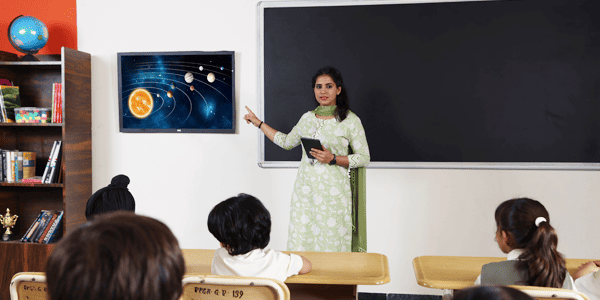Achieve Academic Success with Primary Science Tuition Singapore
Achieve Academic Success with Primary Science Tuition Singapore
Blog Article
Discover the Important Benefits of Understanding Key Scientific Research for Young Students
The significance of primary science education and learning for young learners extends far past simple knowledge procurement; it acts as an essential pillar in developing necessary skills such as crucial reasoning, analytical, and creative thinking. Involving with scientific ideas with interactive and inquiry-based activities not only cultivates inquisitiveness however also prepares for resistant, confident students. As we check out these advantages even more, it comes to be clear that the effects for future scholastic and personal development are extensive. Nonetheless, what specific methods can teachers employ to make best use of these benefits?
Enhancing Essential Assuming Abilities
Fostering essential assuming skills in young students is essential for their cognitive advancement and future academic success. Vital thinking enables youngsters to analyze info, evaluate proof, and make notified choices, which are crucial abilities in today's information-rich culture. By engaging in scientific query, young students can enhance these abilities as they check out concepts with monitoring, reasoning, and trial and error.
In primary scientific research education and learning, educators can help with important thinking by urging trainees to ask concerns, formulate theories, and carry out experiments. This hands-on approach enables youngsters to exercise analytic and create rational thinking abilities. For instance, when pupils investigate the homes of products or the principles of movement, they discover to assess their findings critically and attract conclusions based upon proof.
In addition, discussions and collective jobs can advertise vital thinking by giving chances for learners to articulate their thoughts, obstacle assumptions, and think about varied viewpoints. By producing an encouraging atmosphere that values inquiry and representation, educators can nurture vital thinking skills that empower young learners to come to be independent thinkers and long-lasting students. Inevitably, boosting these abilities lays a durable structure for their future academic undertakings and individual growth.
Cultivating Inquisitiveness and Expedition

Primary science education supplies an organized setting where young learners can discover numerous phenomena via hands-on experiments and observations. By enabling them to communicate with products and participate in inquiry-based knowing, educators produce opportunities for kids to develop hypotheses, test their ideas, and reason. Such experiences nurture a sense of marvel and exhilaration regarding science.

Structure Confidence in Trouble Fixing
Building confidence in analytical is an important component of main scientific research education and learning that equips young learners to approach challenges with resilience and imagination - primary science tuition Singapore. They establish crucial skills in critical thinking and analysis when kids are urged to involve with clinical principles with hands-on activities and inquiry-based discovering. This procedure not only boosts their understanding of clinical principles however additionally promotes a feeling of possession over their learning
To build confidence, instructors ought to create a supportive setting where mistakes are checked out as opportunities for development rather than failures. This encourages trainees to take risks their website and explore different solutions to problems. By supplying scaffolding and guidance, educators can aid students navigate intricate jobs, progressively boosting their independence in analytic situations.
In addition, joint learning experiences, such as team jobs or experiments, can even more improve pupils' confidence as they discover to verbalize their thoughts and listen to others' perspectives. These interactions nurture social abilities and enhance the concept that analytic is commonly a cumulative undertaking. Ultimately, cultivating self-confidence in problem-solving prepares young students for future scholastic obstacles and outfits them with the devices necessary for lifelong knowing.
Urging Creative Thinking and Technology
In the realm of primary scientific research education and learning, motivating creativity and technology is important for cultivating a vibrant learning environment. By promoting a society where young learners can explore concepts and experiment easily, instructors help students develop important thinking skills and an interest for discovery. Creativity in science urges youngsters to ask questions, create theories, and participate in hands-on tasks that promote their imagination.
Incorporating flexible tasks and inquiry-based learning into the educational program permits trainees to express their one-of-a-kind point of views and solutions. For circumstances, when charged with solving an issue pertaining to their setting, pupils can brainstorm multiple strategies, causing inventive outcomes that showcase their originality. This not only deepens their understanding of clinical principles however also instills a feeling of ownership over their knowing process.
Moreover, creative scientific research education nurtures collaboration among peers, as students typically share ideas and improve one another's insights - primary science tuition Singapore. This collective spirit advertises not only innovation yet also necessary social abilities. Hence, by focusing on creativity and development in key science education and learning, we empower young students to assume critically, accept challenges, and visualize opportunities, laying a strong structure for lifelong understanding and expedition
Getting Ready For Future Learning Challenges
Young students' capability to browse future understanding difficulties hinges on a solid structure in primary scientific research education. This foundational understanding furnishes students with important thinking abilities and an organized approach to problem-solving, important for taking pop over to this site on complex problems in an ever-evolving world. Key science cultivates inquiry-based knowing, urging trainees to ask questions, check out theories, and participate in hands-on experiments.
As they create these skills, students come to be proficient at analyzing information, identifying patterns, and drawing informed final thoughts. Such proficiencies are vital not only in scientific areas but also in modern technology, engineering, and math (STEM), where interdisciplinary expertise is increasingly essential.
Additionally, key science education grows a feeling of interest and strength in young students, allowing them to check out challenges as opportunities for development. As they encounter and get over obstacles in their scientific explorations, they develop confidence in their ability to adjust and introduce.
Eventually, a solid structure in key science not just prepares young learners for scholastic searches yet additionally outfits them with the devices necessary for long-lasting understanding and versatility in a swiftly altering international landscape. By purchasing key science education and learning, we are buying the future capacity of our students.
Final Thought
Understanding key scientific research is crucial for young learners, as it fosters critical reasoning, interest, and imagination. Involving with clinical concepts via hands-on experiments builds and boosts analytic capabilities durability. This foundational expertise not just gears up students to examine data and recognize patterns yet likewise nurtures an inquiry-based attitude. Ultimately, the advantages of main science education and learning prepare children for future academic pursuits and Go Here instill lifelong knowing practices crucial for prospering in an ever-evolving world.
The importance of key scientific research education for young learners prolongs much past simple expertise procurement; it offers as an essential column in developing important abilities such as crucial thinking, analytic, and creativity. By producing an encouraging environment that values query and reflection, teachers can support essential assuming abilities that encourage young students to come to be independent thinkers and lifelong students. Therefore, by prioritizing creativity and development in main scientific research education and learning, we encourage young learners to assume critically, welcome difficulties, and picture opportunities, laying a strong foundation for lifelong learning and expedition.
Young learners' capacity to browse future discovering obstacles hinges on a solid foundation in key scientific research education and learning.Comprehending key scientific research is crucial for young learners, as it cultivates crucial reasoning, curiosity, and creative thinking.
Report this page